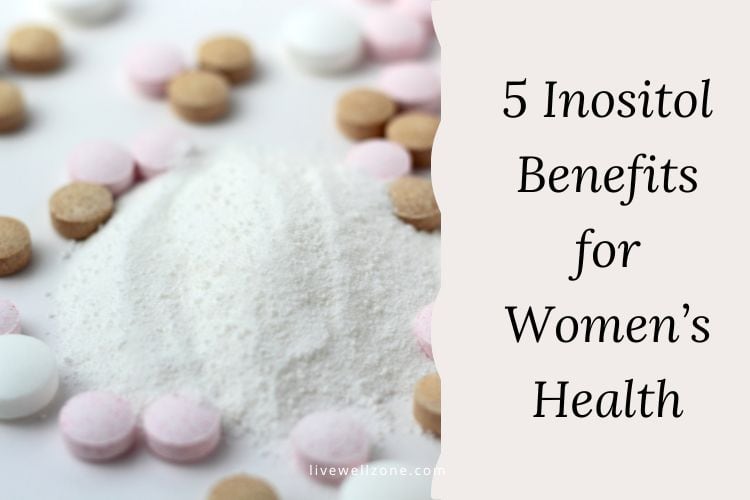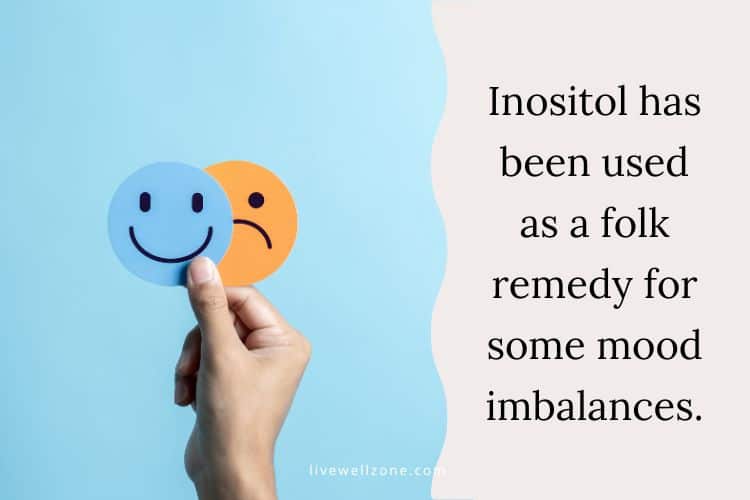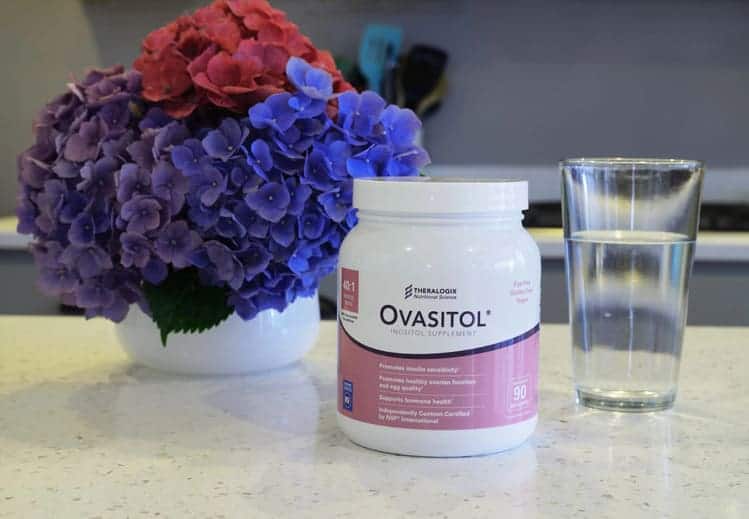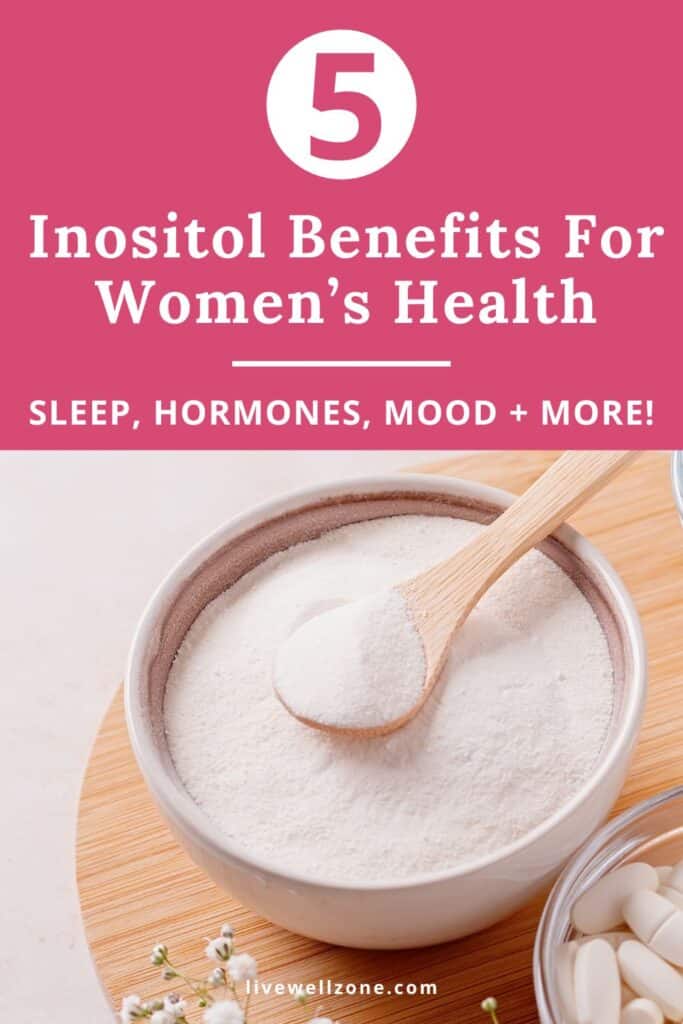
Inositol is an essential nutrient that often flies under the radar. In fact, many women have never heard of it and those who have are mainly aware of its benefits for hormone-related conditions like PCOS (polycystic ovary syndrome – this article on inositol for PCOS provides more details).
But the truth is, inositol does so much more than help with hormone balance.
From potentially supporting our mental health and metabolic function, this nutrient offers a broad range of advantages for women, regardless of age or health concerns.
In this article, we’re going to dive into:
- What inositol is.
- Its benefits for women’s health.
- How to use it.
NOTE: This post contains affiliate links and I earn a commission (at no additional cost to you) if you use them to make a purchase.
WHAT IS INOSITOL AND WHERE DOES IT COME FROM?
Sometimes referred to as vitamin B8, inositol is a naturally occurring carbohydrate (sugar) that is essential for various bodily functions, including:
- Bone formation.
- Reproductive health.
- Maintaining the structure of our cell walls.
- Proper insulin function and blood sugar regulation.
- Balancing “brain chemicals” like dopamine and serotonin, both of which affect our mood, as well as conditions like depression and anxiety.
Overall, there are 9 types of inositol, with myo-inositol and d-chiro inositol being the most talked about (particularly when it comes to hormone balance).
In addition, since inositol is a natural sugar, it is abundant in our food supply.
In fact, the best food sources of inositol are:
- Fruits
- Veggies
- Nuts
- Seeds
- Grains
- Legumes
- Natural sweeteners like raw honey.
BENEFITS OF INOSITOL FOR WOMEN’S HEALTH
1. Improved Insulin Sensitivity

Inositol is best known for its ability to act as an insulin sensitizer.
Insulin sensitivity is crucial for regulating blood sugar levels, which is crucial for our health because when the body becomes insulin resistant, it can lead to various metabolic issues.
In addition, insulin plays a key role in ovarian function and reproductive health.
So, for women – especially those with insulin resistance or metabolic concerns – inositol may be just what you need to bring more balance to your body.
2. Supports Hormone Balance
For many women with hormone-related conditions like PCOS, inositol is their go-to supplement.
One reason why inositol is often used for PCOS is because it improves insulin sensitivity. The side effect of improving insulin sensitivity is that ovulation, ovarian function and the entire menstrual cycle may improve.
In addition, there’s a pathway in the body called the inositol triphosphate pathway.
Inositol triphosphate is a second messenger for various hormones. This means it regulates the activity of other hormones, such as:
- Serotonin.
- Insulin.
- Thyroid stimulating hormone.
- Follicle stimulating hormone (FSH).
When it comes specifically to supporting ovarian function, studies indicate that a combination of myo-inositol and D-chiro – in a 40:1 ratio – may be most effective (1, 2, 3)
3. Mental Health and Mood Regulation

Beyond its physical benefits, inositol has also been studied for its effects on mental health.
As mentioned earlier, inositol affects neurotransmitters like dopamine and serotonin (both of which have a direct influence on mood, stress levels and cognitive function).
Overall, inositol is considered a folk remedy for anxiety and sadness. In addition, some small studies suggest that it may be helpful for depression, panic disorder and other mood-related disorders (source).
4. May Improve Sleep Quality
According to a small study, myo-inositol could play a role in enhancing sleep quality, particularly for women.
The study, which was conducted on 60 pregnant women in Iran, gave participants either:
- 2000 mg of myo-inositol along with folic acid
- A placebo (only folic acid)
After 10 weeks the results showed that the women who took myo-inositol and folic acid experienced improvements in:
- overall sleep quality.
- subjective sleep quality.
- sleep duration.
While the study focused on pregnant women, the results offer promising insights into how myo-inositol could potentially support sleep in the broader population.
5. Heart Health and Blood Pressure
Due to its ability to improve insulin sensitivity, inositol may also improve heart health. Most notably, this nutrient could help improve blood pressure and triglyceride levels.
This is a huge benefit for women because heart disease remains the leading cause of death for women in the U.S. (source).
In addition, high blood pressure is a risk factor for heart disease.
According to a review of 7 inositol studies that involved 322 participants, there was “a significant reducing effect of inositol supplementation on SBP and DBP levels” (source).
In other words, inositol appears to lower systolic blood pressure and diastolic blood pressure.
Moreover, another review of 14 inositol studies found that it may lower (source):
- Triglyceride levels
- Total cholesterol
- LDL-cholesterol levels
HOW TO USE INOSITOL
As with all supplements, there’s no one size fits all with inositol.
So, in this section I’m going to share some things to keep in mind when it comes to supplementing with this nutrient and getting results.
Keep in mind that the best way to get results with this supplement is to work with a professional.
This is particularly important because some people benefit from using myo-inositol, d-chiro or both.
Work with your health care provider to figure out which one(s) you need and how much.
1. Choose the Right Type
Myo-Inositol:
- This is the most abundant form of inositol in the body.
- The ovaries require higher amounts of myo-inositol.
- Abundant in food.
D-Chiro-Inositol:
- Present in smaller amounts in the body.
- Often used together with myo-inositol for conditions like PCOS.
- More abundant in tissues that require glucose storage, such as the liver and muscles (source).
As mentioned earlier, studies indicate that a 40:1 ratio of myo-inositol to D-chiro-inositol may be helpful for PCOS.
One supplement that combines both of these forms in this 40:1 ratio is Ovasitol which you can get here.

Since I’m an affiliate for the company, you also get the discounted price when you use the link to purchase.
2. Add More Inositol-Rich Foods To Your Diet
Nothing beats whole food.
So be sure to incorporate inositol-containing foods into your diet.
Choose from items like:
- Cantaloupe
- Oats
- Citrus fruits (except lemons)
- Beans
- Brown rice
- Corn (preferably organic since most U.S. corn is genetically modified)
- Sesame seeds.
Even though food won’t give you as much inositol as a supplement, remember that whole food comes with a variety of other vitamins, minerals, antioxidants and beneficial compounds that your body needs.
Quick tip: one study looked at 487 foods and found that fruits, legumes, grains and nuts have the highest amounts of myo-inositol. Furthermore, fresh fruits and veggies have more inositol than frozen, canned or cooked varieties.
ADDITIONAL INOSITOL TIPS RESOURCES
Inositol is a multifaceted nutrient with a wide range of benefits for women’s health.
From supporting hormonal balance and mental well-being to cardiovascular health and sleep, it can be truly transformative when used as a supplement (if it’s the right fit for you!).
So, please make sure to consult a healthcare provider to get the most from this supplement.
Wondering how inositol compares to other supplements for women’s health? Check out these other articles:
Inositol vs Berberine (for PCOS): A Complete Guide
Vitex vs Inositol: Benefits | Differences | Which is Better for PCOS and More


